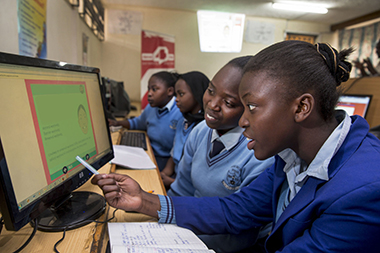The UCSF Institute for Global Health Sciences has received a $1 million contract through the University of Nairobi in Kenya to collaborate on creating a pioneering public health-focused machine learning and data science training program for girls and young women in Kenya. The contract is part of an approximately USD 5.5 million award by Takeda Pharmaceuticals through its global corporate social responsibility efforts.
The training program, titled Enabling Girls in AI and Growing Expertise (ENGAGE), will empower over 800 underprivileged girls and young women across six, primarily rural, regions in Kenya. By cultivating a diversified pool of data scientists, the program will contribute to reducing biases and gender gaps in public health data and artificial intelligence and create a model for scale across the African continent. The University of Nairobi will lead the project while collaborating with IGHS and six other regional universities in Kenya. IGHS’ role will focus on developing the curriculum and delivering the training.
Julius Oyugi, PhD, Director of Research at the University of Nairobi’s Institute of Tropical and Infectious Diseases and the lead researcher of this program, stated, “The ENGAGE program will train girls and young women from less privileged backgrounds and try to bridge the gender-based gap that currently exists among experts in machine learning and artificial intelligence. The program will also leverage data-driven approaches to tackle public health challenges.”
Susie Welty, MPH, co-director of the Data, Innovation and Technology Hub of the UCSF Institute for Global Health Sciences, stated, “UCSF is pleased to partner with the University of Nairobi to provide girls and young women with an opportunity to achieve data science and machine learning skills. It will create unique individual career opportunities and contribute to a more diverse pool of data scientists in Kenya, which will be better equipped to tackle health problems unique to their communities and societies.”
Photo by Jonathan Torgovnik/Getty Images/Images of Empowerment
(edited slightly for use here)
